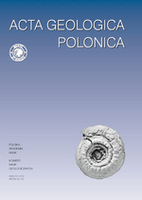
ACTA GEOLOGICA POLONICA
metrics 2024
Advancing geological knowledge for a sustainable future.
Introduction
ACTA GEOLOGICA POLONICA is a distinguished journal published by the Polska Akademia Nauk, in collaboration with the University of Warsaw's Geology Department. Since its inception, it has served as a vital platform for disseminating innovative research in the field of Geology, reflecting a commitment to advancing scientific knowledge in Earth and planetary sciences. With an ISSN of 0001-5709 and an E-ISSN of 2300-1887, this journal provides a rigorous review process and is classified in the Q3 quartile for Geology as of 2023, indicating its growing influence in the discipline. Despite not being open access, the journal facilitates meaningful contributions that span a range of geological topics from fundamental research to applied sciences, thereby enriching the academic landscape. Researchers, professionals, and students alike are encouraged to engage with the valuable findings and discussions contained within its pages, which continue to shape the future of geological inquiry.
Metrics 2024
 0.31
0.31 1.10
1.10 0.90
0.90 41
41Metrics History
Rank 2024
Scopus
IF (Web Of Science)
JCI (Web Of Science)
Quartile History
Similar Journals

GEOLOGICAL QUARTERLY
Fostering Scientific Collaboration in Geology.GEOLOGICAL QUARTERLY, published by the Polish Geological Institute, is a respected journal in the field of geology, offering insights into Earth and planetary sciences since its inception in 2000. With an ISSN of 1641-7291 and an E-ISSN of 2082-5099, this journal serves as a vital platform for researchers, professionals, and students seeking to expand their knowledge in geological disciplines. The journal is positioned in Q3 within the geology category as of 2023 and ranks #172 out of 321 in Scopus, placing it in the 46th percentile among its peers. Although currently not an open-access publication, GEOLOGICAL QUARTERLY reflects the policy of fostering scientific communication and collaboration by disseminating valuable geological research. Its commitment to publishing original articles, reviews, and technical notes ensures that it plays a significant role in advancing geological science and its applications within the academic community. With its base in Warsaw, Poland, the journal stands as an important resource for anyone engaged in or studying the Earth sciences.

STRATIGRAPHY AND GEOLOGICAL CORRELATION
Innovating the Science of Stratigraphy and CorrelationSTRATIGRAPHY AND GEOLOGICAL CORRELATION is a prominent scholarly journal published by PLEIADES PUBLISHING INC, featuring a dedicated focus on the fields of geology, stratigraphy, and paleontology. With ISSN 0869-5938 and E-ISSN 1555-6263, this journal has been disseminating significant research findings since its inception in 1994, continuously contributing to the academic discourse through 2024. Despite not currently offering open access, its relevance is underscored by its Category Quartiles for 2023, where it has established itself as Q3 in Geology and Paleontology, and Q2 in Stratigraphy. STRATIGRAPHY AND GEOLOGICAL CORRELATION ranks #29 out of 55 in Stratigraphy and #186 out of 321 in Geology according to Scopus metrics, positioning it within the competitive landscape of Earth and Planetary Sciences. Researchers, professionals, and students are invited to engage with the journal’s content to deepen their understanding and foster innovation within these critical areas of study.

Austrian Journal of Earth Sciences
Exploring the Depths of Earth SciencesThe Austrian Journal of Earth Sciences, published by SCIENDO, is an esteemed open-access journal specializing in the disciplines of geology, paleontology, and stratigraphy. With an ISSN of 2072-7151, this journal has established itself as a significant platform for innovative research and scholarly communication in the earth sciences. Since its inception in 2007, it has continuously expanded its influence, achieving notable rankings in the Scopus database—#113 in Geology, #42 in Paleontology, and #21 in Stratigraphy, demonstrating its commitment to high-quality publications. The journal holds prestigious quartile rankings of Q1 in both Geology and Paleontology and Q2 in Stratigraphy as of 2023, reflecting its impact and relevance in the scientific community. Researchers and students alike are encouraged to explore and contribute to the evolving discourse within this dynamic field, as the Austrian Journal of Earth Sciences fosters collaboration and knowledge sharing across global platforms.
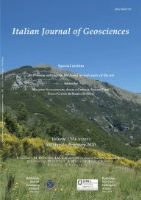
Italian Journal of Geosciences
Unlocking Planetary Insights: Where Earth Meets ResearchItalian Journal of Geosciences, published by the Società Geologica Italiana, is a distinguished platform for the dissemination of research in the fields of Earth and Planetary Sciences and Geology. With an impressive impact factor reflected in its 2023 rankings, where it placed in the Q3 category across its related fields, this journal serves as a vital resource for academics, practitioners, and students. Established in 2010 and poised to continue until 2024, the journal showcases critical advancements and interdisciplinary studies that deepen our understanding of geological processes and Earth systems. Operating under open access options, it offers robust accessibility to a broad audience, facilitating wider dissemination of knowledge. The journal's affiliation with Università degli Studi La Sapienza in Rome, Italy, further underscores its commitment to academic excellence and innovation in geosciences.

Andean Geology
Uncovering the Secrets Beneath the AndesAndean Geology is a prominent open-access journal, published by the SERVICIO NACIONAL GEOLOGIA MINERVA in Chile, dedicated to advancing the fields of geology, geochemistry, petrology, paleontology, and stratigraphy. Since its inception in 2009, the journal has provided a vital platform for the dissemination of research pertaining to the Andean region and beyond, featuring high-quality articles that contribute to our understanding of earth sciences. With an impressive ranking in the Q2 and Q3 quartiles across multiple categories, it reflects a growing impact in the geological community, evidenced by its status within Scopus rankings. Andean Geology not only supports the academic pursuit of knowledge with its open-access policy but also aims to foster collaboration among researchers and professionals worldwide, ensuring wide accessibility of groundbreaking research and promoting academic engagement. By covering a diverse array of topics relevant to the dynamic field of geology, this journal serves as an essential resource for students, professionals, and scholars dedicated to earth and planetary sciences.
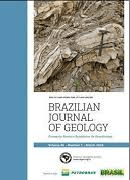
Brazilian Journal of Geology
Pioneering Interdisciplinary Geoscientific InquiryBrazilian Journal of Geology, the flagship publication of the SOC BRASILEIRA GEOLOGIA, has been a beacon of geoscientific research since its inception in 2013. With an ISSN of 2317-4889 and an E-ISSN of 2317-4692, this open-access journal has facilitated the dissemination of high-quality research across various branches of geosciences, making it freely accessible to a global audience since 2014. Hailing from Brazil, the journal proudly holds a Q2 ranking in Earth and Planetary Sciences as of 2023, and ranks #73 out of 195 in Scopus, indicating its growing impact and relevance in the field. The Brazilian Journal of Geology aims to bridge diverse geological studies with interdisciplinary approaches, promoting the understanding and application of geology in addressing contemporary scientific challenges. As it converges research from 2013 to 2024, the journal not only enriches the academic landscape but also serves as a vital resource for researchers, professionals, and students eager to explore the complexities of the Earth and its processes.

CARNETS DE GEOLOGIE
Innovating Knowledge in Geology and BeyondCarnets de Geologie is a prominent open-access journal dedicated to the dynamic fields of geology, paleontology, and stratigraphy. Published by Carnets Geologie and based in France, the journal has been a platform for scholarly communication since 2002, facilitating unrestricted access to high-quality research. With a robust impact reflected in its 2023 quartile rankings—Q2 in Geology, Paleontology, and Stratigraphy—Carnets de Geologie ranks favorably within Scopus, positioning itself at the 60th percentile for Earth and Planetary Sciences. The journal aims to disseminate innovative research findings and foster academic discourse among researchers, professionals, and students interested in the intricate aspects of Earth's history and processes. Encompassing a broad scope that reflects continuous developments in the geological sciences, Carnets de Geologie is dedicated to advancing knowledge and understanding within its community.
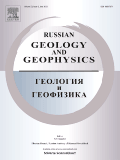
Russian Geology and Geophysics
Unveiling Earth's Secrets, One Study at a TimeRussian Geology and Geophysics is a seminal journal published by GEOSCIENCEWORLD that plays a pivotal role in the dissemination of vital research within the realms of Earth-Surface Processes, Geology, and Geophysics. With an ISSN of 1068-7971 and an E-ISSN of 1878-030X, this journal has witnessed a continuous evolution since its convergence in 2007 and is poised to thrive through 2024. While it is not an Open Access journal, it is recognized for its significant contributions to the academic community, holding a respectable Q2 ranking in Earth-Surface Processes and Q3 rankings in both Geology and Geophysics as of 2023. The journal’s impact factors align it within competitive quartiles, marking it as an essential resource for researchers and professionals seeking to stay at the forefront of geological and geophysical sciences. By publishing high-quality peer-reviewed articles, the journal fosters an environment of knowledge sharing and innovation, making it indispensable for students, practitioners, and scholars alike who are dedicated to advancing our understanding of Earth's complex systems.
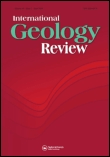
INTERNATIONAL GEOLOGY REVIEW
Exploring Earth's mysteries through rigorous research.INTERNATIONAL GEOLOGY REVIEW, published by Taylor & Francis Inc, is a premier journal dedicated to advancing the field of geology since its inception in 1959. With its Q1 ranking in the field of Geology for 2023, this journal is a significant platform for researchers, professionals, and students exploring the intricacies of Earth and planetary sciences. The journal has been rated in the 81st percentile within Scopus rankings, reflecting its influence and the high quality of articles published. Although it does not offer Open Access options, the journal maintains a rigorous peer-review process to ensure the publication of original and impactful research. With an extensive archive projected to continue until 2024, INTERNATIONAL GEOLOGY REVIEW serves as an essential resource for those seeking to deepen their understanding of geological phenomena, making it a vital contributor to the global scientific community.

Russian Journal of Pacific Geology
Navigating the Complexities of Pacific GeologyThe Russian Journal of Pacific Geology is a pivotal resource in the realm of Earth sciences, published by PLEIADES PUBLISHING INC. With an ISSN of 1819-7140 and an E-ISSN of 1819-7159, this journal has established itself as a significant publication for researchers, professionals, and students who explore the intricate geology of the Pacific region. Covering a wide array of topics including Geochemistry, Petrology, Geology, Geophysics, Oceanography, Paleontology, and Stratigraphy, the journal's relevance is underscored by its categorization within Q3 quartile rankings across multiple disciplines in the 2023 metrics. Operating from the United States, its influential publications span from 2007 to 2024, attracting a diverse audience dedicated to advancing the geological sciences. Although not an open access journal, it serves as a valuable repository of knowledge, presenting original research, reviews, and critical discussions that enhance scholarly discourse. The journal is recognized within the global scientific community, addressing significant geological challenges while fostering collaboration and innovation among scholars in the Earth and Planetary Sciences.